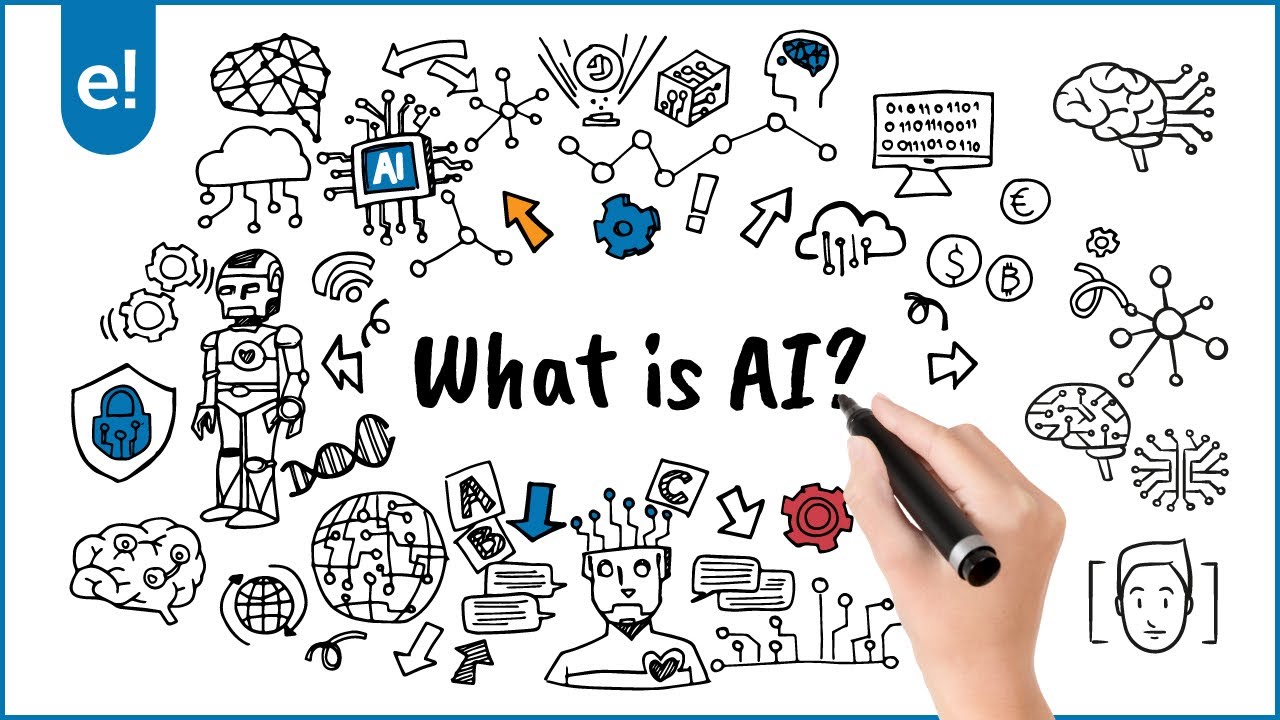What is Artificial Intelligence? | Quick Learner
Summary
TLDRArtificial intelligence (AI) is a computer science field that emulates human intelligence, enabling computers to see, understand environments, and process language. It relies on vast datasets to identify patterns and make predictions. While AI has made strides, such as AlphaGo's victory in Go, it still cannot match the human brain's versatility in tasks like driving or playing games, highlighting the gap between AI's computational power and the complexity of human cognition.
Takeaways
- 🧠 Artificial Intelligence (AI) is a broad branch of computer science that aims to mimic human intelligence using computers.
- 👀 AI involves tasks that typically require human intelligence, such as vision, understanding, and interaction with the environment.
- 🔍 AI algorithms rely on large datasets to identify patterns, make predictions, and recommend actions.
- 🤖 Popular culture, especially science fiction, has shaped perceptions of AI, often associating it with super-powered robots and hyper-intelligent devices.
- 🎥 Hollywood has popularized AI, but the real-world applications and capabilities of AI differ from these fictional portrayals.
- 🏆 AI has achieved notable successes, such as AlphaGo defeating a professional Go player, showcasing its specialized capabilities.
- 🚗 Despite these successes, current AI systems have limitations and cannot perform tasks outside their specialized training, like driving a car or playing Monopoly.
- 🧐 AI's computing power is significant, but the human brain is versatile and can handle a wider range of data and methods.
- 🌐 AI is already integrated into many aspects of daily life, even though it may not always be apparent.
- 🚀 AI's potential is vast, but it is still a work in progress, with ongoing research and development aimed at expanding its capabilities.
- 🔑 The key to AI's capabilities is data; the more data available, the more sophisticated and accurate AI systems can become.
Q & A
What is the general concept of artificial intelligence as introduced in the script?
-The script introduces artificial intelligence as the use of computers to perform tasks that typically require human intelligence, such as seeing, understanding environments, recognizing patterns, and comprehending spoken language.
What are some examples of tasks that AI can perform according to the script?
-Examples of tasks AI can perform include seeing with digital 'eyes', processing visual information, understanding environments, recognizing patterns, and interpreting spoken language.
What role do large datasets play in the functioning of AI algorithms?
-Large datasets allow AI algorithms to identify patterns, make predictions, and recommend actions by providing the necessary information for the algorithms to learn from.
How does the script describe the capabilities of AI in comparison to the human brain?
-The script acknowledges that while AI has massive computing power, the human brain can handle a much broader set of data and methods, and in some ways, today's best AI still can't compete with the human brain.
What is an example of AI's achievement mentioned in the script?
-The script mentions the achievement of the computer program AlphaGo, which defeated a legendary professional Go player in 2016.
What limitations does the script highlight for AI in comparison to human capabilities?
-The script highlights that despite AlphaGo's success in Go, it wouldn't be able to perform other tasks like driving a car, walking, or playing Monopoly on its own.
What is the significance of pattern recognition in AI?
-Pattern recognition is significant in AI as it allows the algorithms to learn from data, make sense of information, and make informed predictions or decisions.
How does AI utilize spoken language understanding?
-AI uses natural language processing to interpret and understand spoken language, enabling interactions with humans and the ability to process verbal commands or queries.
What is the relationship between AI and the field of computer science?
-The script positions AI as a broad branch of computer science, encompassing various subfields and techniques that enable machines to mimic cognitive functions associated with human intelligence.
In what ways is AI integrated into our daily lives according to the script?
-The script suggests that AI is already all around us, implying that AI technologies are integrated into various aspects of daily life, although it does not specify particular examples.
What does the script imply about the future potential of AI?
-The script implies that while AI has made significant strides, as evidenced by AlphaGo's victory, there is still room for growth and development to reach broader capabilities comparable to the human brain.
Outlines

This section is available to paid users only. Please upgrade to access this part.
Upgrade NowMindmap

This section is available to paid users only. Please upgrade to access this part.
Upgrade NowKeywords

This section is available to paid users only. Please upgrade to access this part.
Upgrade NowHighlights

This section is available to paid users only. Please upgrade to access this part.
Upgrade NowTranscripts

This section is available to paid users only. Please upgrade to access this part.
Upgrade NowBrowse More Related Video

IMT - AI (1) - Apa itu AI?, Sejarah, dan Penerapan AI

What is Artificial Intelligence for Kids | What is AI | AI for Kids | AI explained for Kids |AI Kids

Artificial Intelligence in 2 Minutes | What is Artificial Intelligence? | Edureka

How we teach computers to understand pictures | Fei Fei Li

Introduction to Artificial Intelligence

MENGUAK AI DALAM 5 MENIT ! Definisi, Konsep Dasar dan Cara kerja AI || Artificial Intelegent #ai
5.0 / 5 (0 votes)